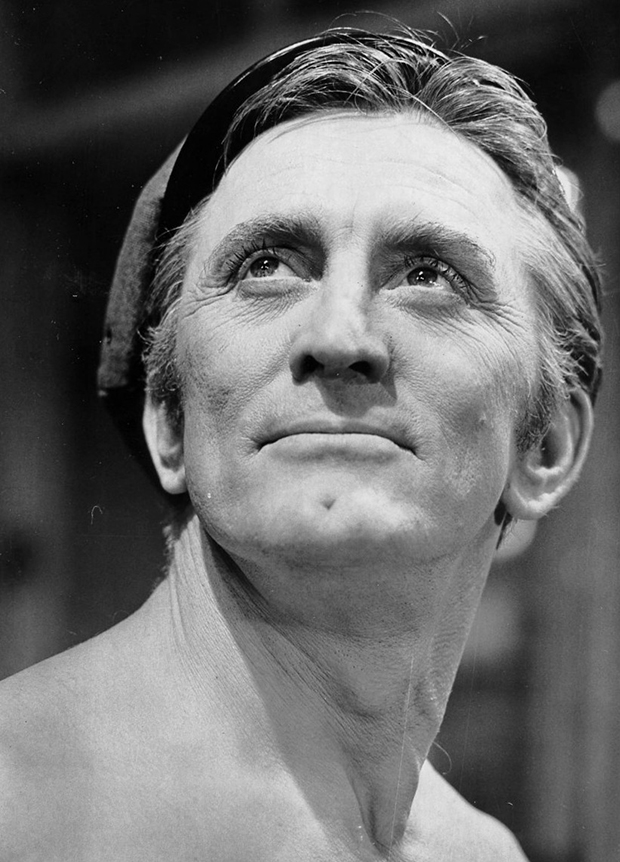Remembering the Broadway Career of the Legendary Kirk Douglas
Douglas is known for films like ”Spartacus”, but he cut his teeth on the Great White Way during the Golden Age.

(© Henry Grossman/Wikimedia Commons)
Kirk Douglas died Wednesday, February 5, at the age of 103. As one of the last surviving movie stars from the Golden Age of Hollywood, he left behind a résumé studded with legendary screen hits: Spartacus, Paths of Glory, and The Bad and the Beautiful among them. But Douglas was also one of the last surviving actors from the Golden Age of Broadway, beginning his stage career in the 1940s and 1950s before making the transition to movie star.
The son of a poor rag seller, Douglas — then Issur Danielovitch (or the more Americanized Izzy Demsky) — graduated from high school in 1934 with no money, but with a determination to go to college. He managed to attend St. Lawrence University with $164 in his pocket, working as a janitor and performing in summer stock at venues like the Tamarack Playhouse in the Adirondack Mountains and the Nuangola Grove Theatre in Pennsylvania. At Tamarck, he adopted what would be his stage name for the rest of his life: Kirk Douglas.
Douglas got a scholarship to the American Academy of Dramatic Arts, where he graduated in 1941. An August 1941 review from The Wilkes-Barre Record says that Douglas "adeptly handled" the "rapid-fire conversation, sleuthing, and excitement" in a Nuangola production called Mr. and Mrs. North. In November, he went on to make his Broadway debut in Isabel Leighton and Bertram Bloch's Spring Again, directed by Guthrie McClintic. McClintic cast him as a singing Western Union messenger, who delivered a telegram sung to the tune of "Yankee Doodle." McClintic and wife Katharine Cornell then cast him as an offstage voice in Chekhov's The Three Sisters.
After being discharged from the army due to injuries suffered in an encounter with a Japanese submarine, Douglas returned home and resumed his stage career. He replaced Richard Widmark in the comedy Kiss and Tell on Broadway, followed by bit roles in works titled Trio and Alice in Arms. George Abbott invited him to audition for a new musical written by Leonard Bernstein, Betty Comden, and Adolph Green called On the Town. He landed the leading role, the sailor Gabey, but suffered what he called a "psychosomatic illness": his voice got smaller as he rehearsed, until it all but disappeared. John Battles replaced him.
In June 1945, he played the Unknown Solider in a play called The Wind Is Ninety, the work which directly led him to Hollywood after producer Hal Wallis saw it at the urging of Douglas's longtime friend, Lauren Bacall. Woman Bites Dog (1946) was Douglas's last Broadway credit until 1963. Douglas had bought the rights to Ken Kesey's novel One Flew Over the Cuckoo's Nest and hired Dale Wasserman to adapt it for the stage. Douglas played the leading role of Randle P. McMurphy. It only ran for a few months. Douglas worked for years to get a film version made, eventually giving the rights to his son, Michael Douglas, who got it to the big screen as a vehicle for Jack Nicholson. Cuckoo's Nest marked Douglas's final Broadway appearance.
In 2002, Kirk Douglas and wife Anne made a $2.5 million contribution to the Los Angeles-based Center Theatre Group, which allowed them to transform a 1940s movie house, the Culver Theater, into a 317-seat live theater venue. Renamed the Kirk Douglas Theatre, the venue is now in its 16th season, and housed Douglas's autobiographical show Before I Forget in 2009.
Center Theatre Group dimmed the lights of its marquee on the night of Douglas's death in honor of its namesake.







